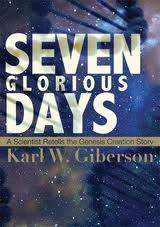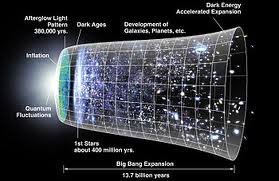 Problem: The 7-day creation story in Genesis 1 reflects outdated ways of thinking of the universe, but modern scientific models of creation have no soul.
Problem: The 7-day creation story in Genesis 1 reflects outdated ways of thinking of the universe, but modern scientific models of creation have no soul.
Solution: Write an updated version of the Genesis story from the vantage point of contemporary science.
But is there such a thing? And if so, who is able (and nervy enough) to pull it off?
The answer, of course, is Karl Giberson, the author of nine books on science and religion, including Saving Darwin: How to Be a Christian and Believe in Evolution and (with Francis Collins) The Language of Science and Faith: Straight Answers to Genuine Questions
. He is also one of the founders of The BioLogos Foundation and a frequent contributor to the Huffington Post.
His latest book is Seven Glorious Days: A Scientist Retells the Genesis Creation Story. In his own words (pages 2-4), here is the basic point Giberson is making:
Preserving the ancient science of the Genesis creation story in the face of what science has discovered makes it look tarnished, like it is showing its age. The story’s once-vibrant colors can seem faded and scratched by the clinical, mathematical, and coldly rational tools of modern science. However, the secular scientific story we live with today has lost its power to move us because it seems opaque and impersonal, with no natural place for us….The unchanging character of the biblical text–once celebrated as timeless, ancient wisdom into the way things are–appears defeated by the impermeable objectivity of a science that looks to the future for wisdom, not the past. But humans need more than a mechanical story about how the gears and pulleys of the cosmos pulled life up out of the primordial ooze. We need a robust, full-orbed creation story, with a place for us….
So many times I have wondered what the Genesis story would look like if we could update it with the science of today–replacing the seven days of creation with billions of years and recasting the whole story in the context of modern science.
If we could do this, it would be easier for us to believe that God is the Creator. The more we tie God’s creative work the ancient world of Genesis, the less likely people are to take the idea of a creator God seriously…
I offer this book as a literary exercise in what the Genesis story might look like if we could update it with the wisdom and latest understanding gained from modern science.
Giberson retells the creation story in seven “epochs” to correspond to the seven days of Genesis 1, though–he is quick t0 tell us–this is not to be misunderstood as reflecting the “profoundly misguided…interpretive tradition that treats the ‘Days of Creation’ as cosmic and geological epochs” (page 5). Rather, his seven stages reflect “how the scientific story appears in terms of the sequence of events” (page 6).
The result is a layperson’s overview to cosmic, geological, and biological evolution couched in the rhythm and language of Genesis 1.
Each chapter covers one of the seven “epochs” of creation, and I summarize them here:
The First Day of Creation: The Big Bang and the “pattern of God’s purpose from which everything would emerge and toward which everything would evolve.”
The Second Day of Creation: Atoms and molecules, the building blocks of everything from galaxies to humans.
The Third Day of Creation: Gravity fuses hydrogen atoms into stars, and the process by which stars shine build the periodic table of the elements.
The Fourth Day of Creation: Atoms arrange into molecules, and solar systems appear with chemically rich planets orbit stars–though liquid water is rare.
The Fifth Day of Creation: Liquid water and complex chemical raw material bring about life (as we know it, at least). DNA drives life-forms to greater and greater complexity–the multi-celled organism with specialized functions.
The Sixth Day of Creation: As complexity increased, so did the need to process information–which led to “a remarkable central processing unit,” the brain, that which allows mathematics, language, music, and art.
The Seventh Day of Creation: Humans, the most advanced of life forms, becomes deeply religious, which includes moral abstractions, questions about the meaning of life, and trying to understand where everything came from.
Seven Glorious Days is under 200 pages and written on a popular level, including some pictures, diagrams, and a manageable number of endnotes. Giberson knows the terrain intimately and his notoriety for popularizing the science/faith issue is wide-spread. He is also gifted writer, and so manages to present complex information in both and informative and entertaining manner.
